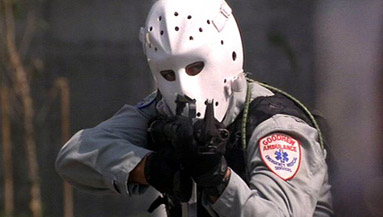Viking Night: Heat
By Bruce Hall
June 24, 2014
BoxOfficeProphets.com

In some ways, Heat is a meditation on the way morality and perspective depend so heavily on one another. In other ways, it’s an examination of the dysfunctional family dynamic - assuming your family solves things with machine guns and industrial explosives. The focus of the story is on the cat and mouse pursuit of master thief Neil McCauley (Robert De Niro) by police detective Vincent Hanna (Al Pacino). McCauley’s gang is responsible for a truly epic armored car heist that goes wrong when the obligatory loose cannon of the gang goes off his wheels and shoots the bank guards. Hanna takes the case, immediately absorbing himself in it the way pigs take to mud.
This becomes a problem with his wife Justine (Diane Venora), and step daughter Lauren (Natalie Portman), both of whom are equal parts anger and need. McCauley has his own problems. His right hand man Shiherlis (Val Kilmer) has problems with gambling, and not being an abusive prick to his wife Charlene (Ashley Judd). The bearer bonds they stole from the truck belong to a sadistic criminal who wants the thieves dead. And Waingro (Kevin Gage) - the one who started the shooting - is nowhere to be found and remains a liability. And with his own relationship on the rocks, Hanna has nothing to do all day but circle McCauley like a shark. This is something nine out of ten violent bank robbers say makes it super hard to do business.
As the noose tightens, McCauley and Hanna take an interest in one another, each able to see some of himself in his counterpart. Hanna is a devoted family man who happens to be no less married to his job. McCauley prides himself in being tied to nothing, and lectures Shiherlis about this all through the film. He sees his friend’s marriage to horse racing and Charlene to be unnecessary burdens, unsuitable for a life on the run. And yet everywhere his crew goes, McCauley is the only one who’s always alone, and it quietly eats at him. Even that psycho Waingro has a girlfriend - whom he eventually murders - but you get the point.
Heat is as much about the inhumanity we inflict upon ourselves as to each other.
Which is probably why the movie is so long. There are a lot more characters than I’ve named here, and most of them have at least some semblance of backstory. Heat is a slow burn, swathed in layers of sweeping drama before exploding into a glorious orgy of violence. It trudges thoughtfully through Mann’s trademark cityscapes, humorless but never unpleasant. It’s accompanied by a soundtrack that’s sexy while you’re listening to it, but damned if I can recall any of it now. Like a really dry martini, it’s good and then it goes away. The enormous cast is uniformly strong, featuring good performances by everyone from future bad boy Tom Sizemore, future president Dennis Haysbert and human sledgehammer Henry Rollins to Jeremy Piven and some guy named Danny Trejo. If anyone knows what happened to any of these people, shoot me an email. It’s like they all dropped off the face of the earth or something.
Again, my only complaint with Heat is that it’s so long you might lose the feeling in your legs by the end credits. But you won’t have taken your eyes off the screen. Heat is “too long,” but in the same way that martini I mentioned was “too good.” It’s a decadent, larger-than-life indulgence that won’t necessarily change the way you look at life, but don’t be surprised if you become a little more uncompromising about heist movies (or find yourself wondering why an inferior film like Miami Vice cost five times as much to make). And the next time someone points a machine gun at you and asks for your ATM code, maybe you’ll remember as you hand over your wallet - he has feelings too.